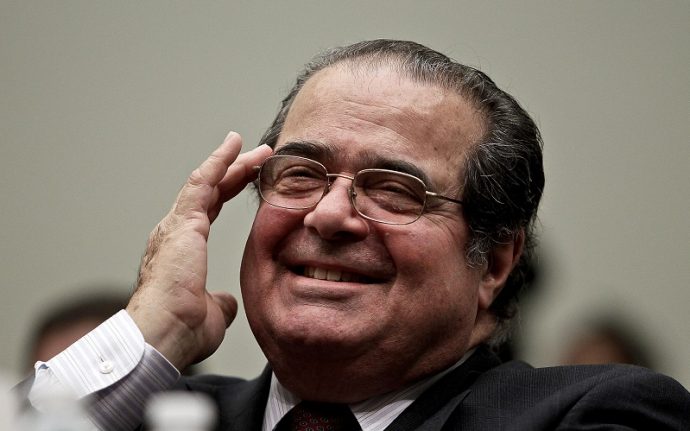A couple of excerpts from Justice Scalia’s dissent, and a link to the full dissent is included below.
First, Scott Johnson over at powerlineblog posted some of Scalia’s dissent here, and Johnson himself wrote “It’s a sad day for the Court and also for the country.” Here’s Scalia:
[W]hat really astounds is the hubris reflected in today’s judicial Putsch. The five Justices who compose today’s majority are entirely comfortable concluding that every State violated the Constitution for all of the 135 years between the Fourteenth Amendment’s ratification and Massachusetts’ permitting of same-sex marriages in 2003. They have discovered in the Fourteenth Amendment a “fundamental right” overlooked by every person alive at the time of ratification, and almost everyone else in the time since. They see what lesser legal minds—minds like Thomas Cooley, John Marshall Harlan, Oliver Wendell Holmes, Jr., Learned Hand, Louis Brandeis, William Howard Taft, Benjamin Cardozo, Hugo Black, Felix Frankfurter, Robert Jackson, and Henry Friendly—could not.
They are certain that the People ratified the Fourteenth Amendment to bestow on them the power to remove questions from the democratic process when that is called for by their “reasoned judgment.” These Justices know that limiting marriage to one man and one woman is contrary to reason; they know that an institution as old as government itself, and accepted by every nation in history until 15 years ago, cannot possibly be supported by anything other than ignorance or bigotry. And they are willing to say that any citizen who does not agree with that, who adheres to what was, until 15 years ago, the unanimous judgment of all generations and all societies, stands against the Constitution.
The opinion is couched in a style that is as pretentious as its content is egotistic. It is one thing for separate concurring or dissenting opinions to contain extravagances, even silly extravagances, of thought and expression; it is something else for the official opinion of the Court to do so.
Of course the opinion’s showy profundities are often profoundly incoherent. “The nature of marriage is that, through its enduring bond, two persons together can find other freedoms, such as expression, intimacy, and spirituality.” (Really? Who ever thought that intimacy and spirituality [whatever that means] were freedoms? And if intimacy is, one would think Freedom of Intimacy is abridged rather than expanded by marriage. Ask the nearest hippie. Expression, sure enough, is a freedom, but anyone in a long-lasting marriage will attest that that happy state constricts, rather than expands, what one can prudently say.)
Scott Johnson writes: “I’ve deleted the from these two passages, but I wouldn’t want you to miss Justice Scalia’s footnote 22:”
If, even as the price to be paid for a fifth vote, I ever joined an opinion for the Court that began: “The Constitution promises liberty to all within its reach, a liberty that includes certain specific rights that allow persons, within a lawful realm, to define and express their identity,” I would hide my head in a bag. The Supreme Court of the United States has descended from the disciplined legal reasoning of John Marshall and Joseph Story to the mystical aphorisms of the fortune cookie.
Read all of what Scott Johnson wrote and excerpted here.
You can read Scalia’s entire dissent here.
Image credit: Photo of Justice Scalia by Stephen Masker via Wikipedia.

